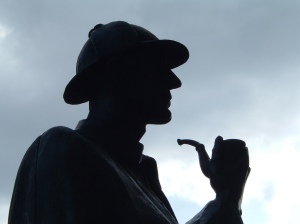In May of last year, we covered a lawsuit between Sherlock Holmes scholar Leslie S. Klinger and the estate of the original creator of Holmes, Sir Arthur Conan Doyle. Instead of paying licensing fees for the right to publish his own collection of original short Sherlock Holmes stories, Klinger brought a lawsuit seeking declaratory judgment to settle the copyright issue of whether or not elements of Sherlock Holmes had entered into the public domain. A week ago, the federal judge presiding over the case ruled that all elements of the Sherlock Holmes character and his sidekick, Dr. Watson, that were created by Doyle before 1923 are no longer protected by copyright.
Beginning in 1887, Doyle published four novels and 56 short stories about Holmes, with only the final ten stories published after 1923, some as late as 1927. The stories published before 1923 have entered the public domain, but the latter ten are still protected by copyright law in the United States.
Klinger argued that the story and character elements published before 1923 have entered the public domain and should be free for the public use. The Doyle estate, on the other hand, presented a novel legal argument: that Holmes and Watson were “continually developed throughout the Canon,” and that the copyright protecting the final ten stories should extend to the entire collection of stories, including the Holmes and Watson characters. The final copyrighted story will not enter the public domain until 2022.
After carefully considering both arguments, the judge held that Klinger is entitled to use elements of the Holmes stories and characters that were published before 1923, while the post-1923 elements are still protected. The judge ruled that where an author has used the same character in a series of works, some of which are in the public domain, the public is free to copy elements from the public domain works.
As part of his argument for the post-1923 elements, Klinger argued they do not qualify for copyright protection, because they do not “complete” the character. These elements include (1) Watson’s second wife, (2) Watson’s background as an athlete, and (3) Holmes’ retirement from his detective agency. Citing Scott v. WKJG, Inc., which noted that “copyright protection does not extend to ideas, plots, dramatic situations and events,” Klinger argued that the new stories are events, not characteristics of the Holmes or Watson characters. But the judge disagreed, stating that these elements do not fit within the categories articulated in Scott. Instead, they constitute copyrightable “increments of expression.”
The increments of expression test concerns the copyrightability of derivative works. One of the exclusive rights afforded copyright holders is the right to “prepare derivative works based upon the copyrighted work.” The Copyright Act specifically grants copyright protection “in the incremental original expression he contributes” as long as the newly created derivative work does not infringe on the original, underlying work. These “increments of expression” include “[s]torylines, dialogue, characters and character traits.” Applying this test to the case at hand, the judge held that the post-1923 elements constitute derivative elements and are therefore copyrighted.
Following the ruling, Klinger stated on his website that “Sherlock Holmes belongs to the world.” And it appears that, in effect, he now does—except for the parts of his tales published after 1923.
See here for the opinion: http://www.scribd.com/doc/194106658/Gov-uscourts-ilnd-280181-40-0
